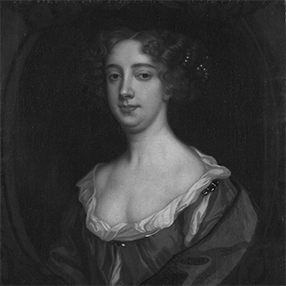In Imitation of Horace
I
What mean those Amorous Curles of Jet?
For what heart-Ravisht Maid
Dost thou thy Hair in order set,
Thy Wanton Tresses Braid?
And thy vast Store of Beauties open lay,
That the deluded Fancy leads astray.
II
For pitty hide thy Starry eyes,
Whose Languishments destroy:
And look not on the Slave that dyes
With an Excess of Joy.
Defend thy Coral Lips, thy Amber Breath;
To taste these Sweets lets in a Certain Death.
III
Forbear, fond Charming Youth, forbear,
Thy words of Melting Love:
Thy Eyes thy Language well may spare,
One Dart enough can move.
And she that hears thy voice and sees thy Eyes
With too much Pleasure, too much Softness dies.
IV
Cease, Cease, with Sighs to warm my Soul,
Or press me with thy Hand:
Who can the kindling fire controul,
The tender force withstand?
Thy Sighs and Touches like wing’d Lightning fly,
And are the Gods of Loves Artillery.
Carminum Liber Primus, Ode Quintus
Quis multa gracilis te puer in rosa
Perfusus liquidis urget odoribus
Grato, Pyrrha, sub antro?
Cui flavam religas comam
Simplex munditiis? Heu! quotiens fidem
Mutatosque Deos flebit, et aspera
Nigris aequora ventis
Emirabitur insolens,
Qui nunc te fruitur credulus aurea;
Qui semper vacuam, semper amabilem
Sperat, nescius aurae
Fallacis. Miseri, quibus
Intemptata nites! Me tabula sacer
Votiva paries indicat uvida
Suspendisse potenti
Vestimenta maris Deo.
This poem is in the public domain. Published in Poem-a-Day on March 11, 2023, by the Academy of American Poets.
“In Imitation of Horace” first appeared in Aphra Behn’s collection Poems upon Several Occasions (R. Tonson and J. Tonson, 1684). As its title suggests, the poem is a very loose translation of Ode V from the first book of Odes by the Roman lyric poet Horace, first published in Latin in roughly the year 23 BC. In “Aphra Behn’s Horace,” published in Restoration: Studies in English Literary Culture, 1660–1700, vol. 23, no. 2 (Fall, 1999), scholar Elizabeth V. Young, the Carl M. and Elsie A. Small Professor of English at Mount Holyoke University, writes that Behn’s ode “obscures the gender of the addressee and thus blurs the gender of the speaker to some extent as well. Behn’s speaker addresses a ‘Charming Youth,’ a term usually signifying a young man, and yet the speaker describes the youth’s beauty in conventionally feminine terms,” despite that “Pyrrha, the traditional addressee of Horace’s poem, is feminine, and the speaker is a scorned male lover parallel to the he of line five.” Young concludes that “Behn’s translation validates feminine desire, even as the potential dangers of desire—delusion, slavery, death—are enumerated. In creating the speaker as an agent of her own desire, Behn implies that women need not be complicit in the commodification of women; women can resist the concept that is presented as intrinsic and inevitable in the Horatian world.”

